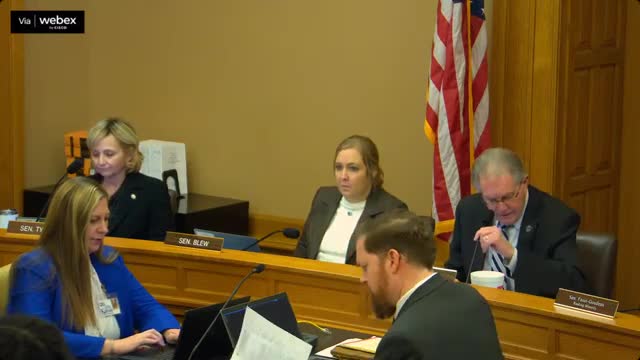Kansas Senate committee advances bill to redistribute historic-horse-racing revenues, limits HHR machines to Sedgwick County
Get AI-powered insights, summaries, and transcripts
Subscribe
Summary
The Senate Federal and State Affairs Committee on an as‑amended voice vote advanced Senate Bill 260, which revises licensing rules for horsemen’s organizations and directs a new split of historical horse race (HHR) tax revenues after the commission’s operating expenses are paid.
The Senate Federal and State Affairs Committee on an as‑amended voice vote advanced Senate Bill 260 on a motion to pass it favorably, moving language that redraws licensing rules for horsemen’s organizations and redirects tax revenues generated by historical horse racing machines.
Jason Long, revisor for the committee, told members that “Senate Bill 260 does make various amendments to the Kansas Pari‑Mutuel Racing Act,” and described changes to how organization and facility licenses may be granted and how revenues from historical horse race (HHR) machines would be distributed.
The bill removes certain location restrictions from the definitions of “horsemen’s association” and “horsemen’s nonprofit organization,” adjusts eligibility and approval requirements for organization licenses, and revises distribution of tax receipts from HHR machines. Under the bill as discussed in committee, after the commission’s operating expenses are paid, 30% of the remaining HHR tax revenues would be transferred to the Kansas Horse Breeding Development Fund and 70% to the Horse Fair Racing Benefit Fund.
The committee also adopted an amendment clarifying that authorization to operate historical horse racing machines remains limited to the single facility in Sedgwick County that was allowed those machines under prior law. Jason Watkins, representing the Park City Golden Circle project, said the amendment was intended to preserve the existing, Sedgwick‑County‑only authorization for HHR machines while allowing other license types and live racing opportunities elsewhere in the state.
Proponents told the committee the bill is intended to revive a once‑larger industry and channel some HHR revenue to breed‑and‑track support. Dr. Dwayne Droge, representing District 13, said Eureka Downs is the oldest track west of the Mississippi and urged committee members to “pass Senate Bill 260 out of committee with a strong yes.” Justine Staton, executive director of the Kansas Horse Council, described the bill as a boon for rural agriculture and training programs. Kurt Eck, a longtime breeder and member of the Kansas Quarter Horse Racing Association, noted similar statutes in other states that supporters say sparked new economic activity.
Committee members focused questions on two issues: how the bill treats the commission’s oversight costs and the definition and geographic limit for HHR machines. On the fiscal side, the committee heard that the bill directs the commission to pay its operating expenses from the state racing fund first; Jason Long and the committee revisor noted the bill’s language could be clarified to state explicitly that the amount required for operating expenditures refers to operating expenses of the commission. The fiscal note attached to the bill did not give precise revenue counts; staff explained it shows only a potential, unspecified reduction in revenues to an unrelated fund beginning in fiscal year 2027 if distributions change.
Project proponents also described the Park City/Golden Circle redevelopment (the former Wichita Greyhound Park) as a multi‑phase entertainment venue; witnesses said the project budget had grown from about $55 million to roughly $135 million and that the initial HHR authorization allows up to 1,000 HHR machines in Sedgwick County.
On procedure, the committee adopted the clarifying amendment by voice vote and then voted to pass SB 260 favorably as amended. The final floor motion to pass the bill was moved by Senator Bloom and seconded by Senator Clifford. Senator Francisco recorded an abstention on the final motion; the roll was otherwise taken by voice and individual yes/no tallies were not recorded in the transcript.
The bill will proceed from committee to the Senate floor as amended. Committee members said they may return to technical clarifications before floor action if needed.
